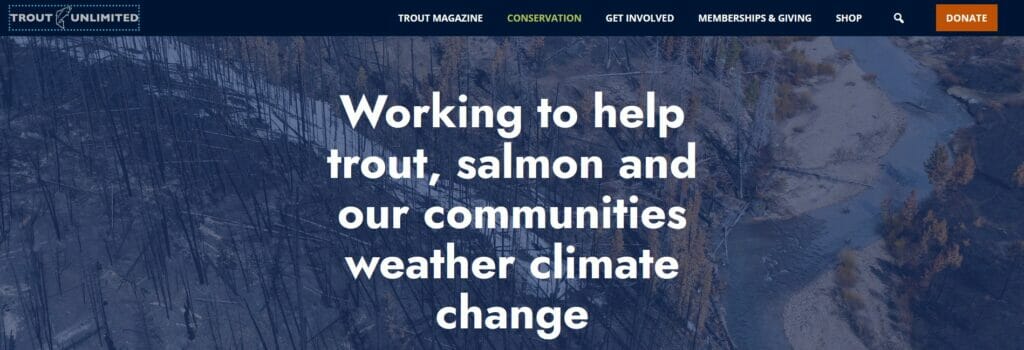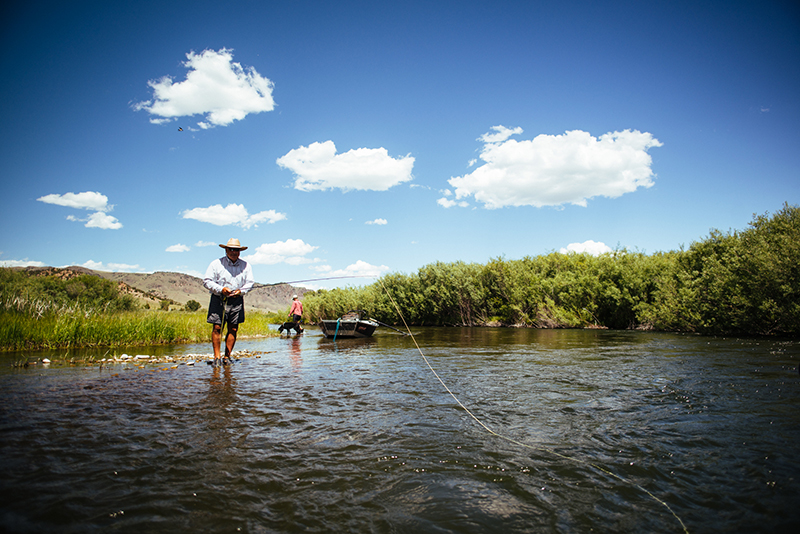The Climate Change Workgroup welcomes Trout Unlimited members and supporters who want to protect trout and salmon and their habitats from the effects of climate change. We are looking for more volunteers to help us achieve our goals.
There are two ways to get involved.
First, you can join the Climate Change Workgroup for our conversations on the fourth Thursday of each month at 8 pm ET.
Second, please consider volunteering as a Trout Unlimited Climate Change Coordinator for your council or chapter, and help us as we foster climate awareness among our members and in our communities, include climate mitigation features into conservation projects, and advocate for emissions reductions.
Click here to view the training resources for Climate Change Coordinators.
Join our virtual meetings
We meet on the 4th Thursday of each month at 8 pm ET. Email Jeff Holzem or Peter Gray for more information.
Become a TU Climate Change Coordinator
The workgroup created a new volunteer position to advocate for trout by reducing emissions.
Click here to view the training resources for Climate Change Coordinators.
Committee Members’ Email Addresses
- Co-Chair: Jeff Holzem, Missouri
- Co-Chair: Peter Gray, Oregon
- Staff Contacts: Helen Neville, TU Senior Scientist, and Maggie Heumann, Manager of Volunteer Operations
Climate Change Workgroup Goals
- Recruit and train new Trout Unlimited Climate Change Coordinators
- Spread awareness of climate change and its impacts on trout and salmon among our members and in our communities
- Advocate for emissions reductions with members, supporters, the public and elected officials
Climate Change Resources
Below are a wealth of resources that you can tap to learn more about climate impacts on trout and salmon, and to help you build awareness in your chapter, council and community.
TU.org/climate

The Intergovernmental Panel on Climate Change (IPCC)
The IPCC issued its 6th report in March 2023. Their message is urgent.
This document answers some frequently asked questions about climate change and their impacts to coldwater fish resources. It is divided into four sections: general climate change, impacts to trout and salmon, impacts to landscapes and rivers, and getting involved.
This policy statement provides guidance on TU’s approach to climate change. These policies include supporting mechanisms that will reduce greenhouse gas emissions and hasten the shift to low-carbon energy sources, approaches that make communities and landscapes more resilient to the effects of climate change, and conservation activities related to the effects of energy development, production, transmission and transportation on coldwater fisheries and their watersheds. There will likely be various legislative proposals relevant to climate change policy over the next year. TU will put out action alerts about these bills when members can support policies TU favors.
TU Supports the Energy Innovation and Carbon Dividend Act
This policy statement outlines the Climate Change Workgroup’s support for TU’s protect, reconnect, restore, and sustain conservation approach and highlights additional approaches related to climate change.
This article describes three case studies of trout stream adaptation that address existing and climate-driven causes of degradation through habitat restoration. The case studies vary in geography and complexity, but all include restoration efforts intended to address multiple causes of stream degradation and improve the resilience of these streams to floods, droughts, and wildfires. The article describes solutions to common challenges in conducting climate change adaptation, including how to balance scientific assessments with opportunities when choosing projects, how smaller projects can be aggregated to achieve watershed-scale benefits, and how citizen science efforts can augment monitoring programs.
This document outlines a road map for accomplishing the goals of the workgroup – raising awareness of climate change, utilizing TU’s non-partisan outdoor sports people’s voice on adaptation and mitigation issues, and building capacity and diversity within the organization through strategic partnerships. For members wanting to help us reach these goals, please check out the “What can I do?” section of the road map.
Climate Change & Trout: Impacts, Opinions & Ways You Can Help (PowerPoint Slides Only)
Erosion, weeds, chemically produced food, declining wild salmon runs… you name it, we are providing evidence of discordant lifestyles. We have science, we have watershed councils, we have environmental laws, and still, we have declining wild salmon runs. Guess what? It is because of us and our lifestyles, directly affecting wild salmon survival. If we truly want to save wild salmon, only a massive commitment to reducing our ecological footprint, consuming more intelligently, and adopting a heartfelt land ethic can turn the tide in their favor. Are we ready?


